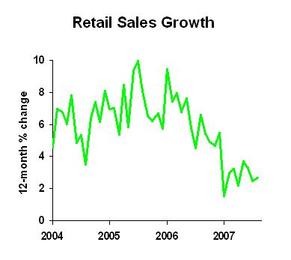I’m more optimistic than many of my peers, but I admit that there’s a significant risk of recession. Before getting into a forecast, let’s talk about why I’m not forecasting a recession. The burden of proof relative to a recession forecast lies on the person forecasting a recession. Most of the time we are not in recession. Over the last few decades, they’ve been arriving about once every 10 years, but even before that, they were only coming once every five years, and lasting less than one year. So the odds are that if you pick a day at random, it will not be a day in a recession. The person forecasting a recession has to tell a story about why we’ll be in recession.
Lots of recession stories just don’t work, though they are common. We have too much debt. We’ll, we’ve had "too much debt" for years with no sign of collapse. The federal deficit is too large. It was even larger coming out of World War II, with no ill effect. Globalization. But the world economy is booming–how can that be bad for us? Falling dollar: theoretically and historically positive for the economy, not negative.
There are a couple of stories that I find credible–not overwhelmingly persuasive, but credible enough that we should all worry. First, the weak housing market spills over into consumer spending. Note that housing itself is not a big enough sector to cause a recession. However, spillover into consumer spending could trigger a recession. Certainly the growth rate of consumer spending has declined, but total spending is not falling, merely growing at a slower rate.

Home price appreciation, which seems to be the most likely issue related to consumer spending, peaked in 2004 (quarter over quarter calculation) or 2005 (year over year calculation). If we were going to see a recession, I think it would be here by now.
The other good reason for worrying about recession is spillover from the financial problems associated with the housing weakness, especially sub-prime loans. What I hear, however, is that standard-quality borrowers can still get credit. That applies to consumers looking for credit cards, car loans, or mortgages, as well as businesses. Even homebuilders, I’m told, are subject to the same credit standards as six months ago (though fewer of them meet the credit standards these days).
So I don’t see spillover from housing problems being large enough to trigger a recession. There’s enough spillover that my forecast is for sub-par growth, in the two to three percent range, for the next four quarters. And I’m continuing to recommend contingency planning for recession, but I ALWAYS recommend that. However, businesses should be planning on increased sales and the need for increased capacity. Companies that hunker down at this time are more likely to lose market share than improve their positions.


